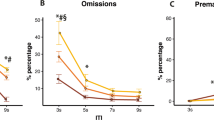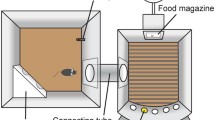Abstract
Rationale: Nicotine has been shown to decrease reaction time and increase anticipatory responses in a five-choice serial reaction time task (5-CSRTT) in rats, but the receptor mechanisms mediating this effect remain unknown. Objectives: To evaluate further the effects of nicotine in this task and to characterise the receptors mediating these effects. Methods: Using a standard 5-CSRTT protocol, rats were trained to respond to a 0.5-s visual stimulus, which was reduced to 0.25 s for experimental sessions to induce a performance decrement. The effects of acute (0.03–0.3 mg/kg IP) and repeated (0.1 and 0.3 mg/kg IP for 5 days) nicotine were studied, as was the ability of mecamylamine (1 mg/kg IP), hexamethonium (5 mg/kg IP), dihydro-β-erythroidine (6 mg/kg IP) and methyllycaconitine (10 mg/kg IP) to antagonise the effects of acute nicotine. Results: Nicotine had no effect on accuracy, but decreased response latencies, improved performance in the less-well attended stimulus locations and increased inappropriate responding after both acute and repeated treatment. The data suggest that nicotine improves readiness to respond and improves target scanning, and decreases the ability to withhold premature responses (i.e. increased impulsivity). Except for the reduction in error latency, all of the effects of nicotine were antagonised by the non-selective, centrally acting antagonist mecamylamine, whereas the peripheral antagonist hexamethonium had no effect, demonstrating that nicotine’s actions are central in origin. Dihydro-β-erythroidine, a competitive nicotinic antagonist, antagonised all of the effects of nicotine. In contrast, the α7 antagonist methyllycaconitine had no significant effects against nicotine. Conclusions: These results demonstrate that the α7 receptor subtype is not involved in the effects of nicotine in the 5-CSRTT and that its effects are more likely to be mediated by a receptor(s) such as α4β2, α4β4 and/or α3β2 which is sensitive to antagonism by dihydro-β-erythroidine.
Similar content being viewed by others
Author information
Authors and Affiliations
Additional information
Received: 12 October 1999 / Final version: 9 December 1999
Rights and permissions
About this article
Cite this article
Blondel, A., Sanger, D. & Moser, P. Characterisation of the effects of nicotine in the five-choice serial reaction time task in rats: antagonist studies. Psychopharmacology 149, 293–305 (2000). https://doi.org/10.1007/s002130000378
Issue Date:
DOI: https://doi.org/10.1007/s002130000378




